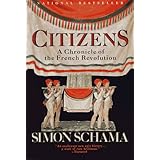
Average Reviews:

(More customer reviews)This monumental book attempts to chronicle the French Revolution from its inception to the end of the Reign of Terror in 1794, using a slightly different style than most conventional histories. In the preface, Schama notes that studies of personalities have largely been replaced by studies of grain supplies, indicating a pattern to seek explanations for historical events and trends in obscure economic factors, rather than in the personalities of the leading figures involved. This Schama is determined to fight against, and he resurrects the nineteenth-century chronicle, with its emphasis on people, high and low. The first section is largely concerned with the Old Régime, which the author reveals a dynamic and rapidly changing society, where the pace of change was indeed too fast instead of too slow, as the popular perception goes. He meticulously shows the rise of revolutionary and nationalist culture, as well as of a new economic order, and the incapacity of Louis XVI and his governments to deal with the new realities. The accounts of the demise of the Old Regime and the beginnings of Revolution are extremely detailed, but also move at a fast pace, with numerous stories of the participants interspersed in the narrative. Schama's use of primary sources is exhaustive, and sometimes even tends to be overwhelming, but the overall effect is an impressive display of historical writing at its finest. But it is in relating the power struggles within the National Assembly and the Convention that Schama truly shines. We hear the strident rhetoric of the Brissotins and later the Jacobins, calling for the bloody consummation of the Revolution. We are at the side of the major players as they are elbowed aside, which often means assassination or execution. We are taken to the provinces, where the Vendéan revolt and the subsequent massacres of thousands by the revolutionary authorities provide horrifying preludes of twentieth century violence and genocide. Indeed the most striking aspect of the book is just how much the forces of totalitarianism in our time owe to their Jacobin predecessors. The speeches of Saint-Just and Marat could have just as easily been uttered by Lenin. The vast outdoor pageants and revolutionary festivals conceived by Jacques-Louis David could measure up considerably well to Albert Speer's monstrous but impeccably designed rallies for Hitler. Schama pulls off an astounding effect, for as the reader progresses in the story, the revolutionary fervor almost creeps out of the page, and one feels the all-encompassing madness. The ending of the book is bleak, showing a disturbing lithograph of Robespierre decapitating the last executioner amidst a forest of guillotines and in the shadow of a giant chimney of cremation bearing the inscription "Here lies all of France." The Terroristes' own pathetic endings provide no closure, merely a bitter aftertaste of disgust.
Schama's contentions are well-reasoned and he succeeds magnificently in exposing both the workings and the soul of the Revolution. His view is a bit too complex to encapsulate in a few words, but it largely centers on the idea that violence was not just another "aspect" of the Revolution, but was always a crucial part of it. The two were effectively inseparable. The roots of this violence were to be found in the patriotic culture and in the enormous influence exercised by Romanticism and especially by the writings of Rousseau, wherefrom came the notions of patriotic sacrifice and patriotic death. Schama claims, with considerable credibility, that the Revolution did not achieve any of the significant reformist objectives of 1789 (indeed, the Jacobins were almost immediately forced to impose economic paternalism), and worse, it inaugurated an era when violence determined the direction of the state more than anything else. What the Revolution did create was "a military-technocratic state of immense power and emotional solidarity," but "its other principal invention had been a political culture that perennially and directly challenged it." The meaning of the entire book, and indeed of the Revolution itself, is summarized next: "Suddenly, subjects were told they had become Citizens...Before the promise of 1789 could be realized, it was necessary to root out Uncitizens." Citizens is a remarkable book, a life-changing read that will reveal mankind at its darkest but also at its most complicated, and that will fiercely bring to life one of the most momentous events in history.
Click Here to see more reviews about: Citizens: A Chronicle of the French Revolution
Click here for more information about Citizens: A Chronicle of the French Revolution

0 comments:
Post a Comment